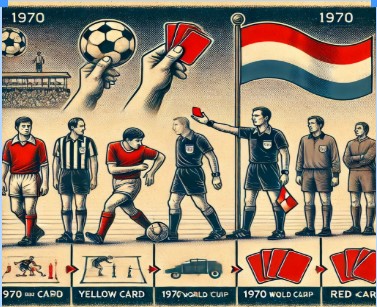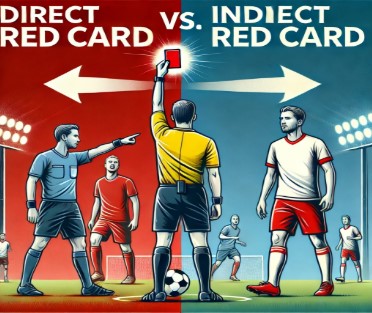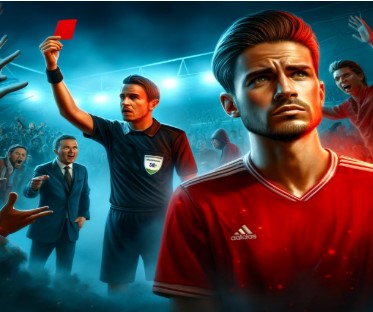Red Card Rule in Football: Ultimate Guide
By Pinkey Sharma |
Date 24-09-2024

Table of Contents
- What is a Red Card?
- Football History: Evolution of Red Cards
- Official FIFA Regulations
- Referee's Authority
- Post-Match Consequences
- Most Common Reasons to Get a Red Card
- Direct vs. Indirect Red Cards
- Impact of a Red Card on the Game
- Disciplinary Process and Appeal of Red Cards
- Historical Instances of Red Cards in Football
- Overview of Some Worst Red Card Incidents in the History of Football:
- Governing the Prevention and Discipline of Players
- Training Initiatives
- Club Policies and Support
- Stats and Analysis on Player Red Cards
- Avoiding Red Card Scenarios
- How vital are red cards in the game?
- Effects of a Red Card on the Game
- Difference Between Red Card and Yellow Card
- When is Red card issued?
- Permanent damage to a player’s reputation and career
- The ability of the Ref to show Red Cards
- Success rate of appeals against a Red Card
Admissions Open for
A red card in sports is a standard disciplinary mechanism to penalize players for severe infractions. Fans and players need to know what it means. A player receiving a red card must leave the game. This rule is quite old.
We will explore the origin, regulations, and impact of the red card and see how it shifts the game and players.
Key Takeaways:
-
A football red card is a method of punishment for violations committed during play.
-
In football, a red card means a player is sent off.
-
The rule of awarding a red card has been in existence for several decades and is one of the most important factors for fair play and sportsmanship.
-
The effect of a red card might be punishable, ruining things not just for the player but also for the team.
-
The red card rule influences the players, coaches, and spectators.
.jpg)
What is a Red Card?
Soccer is a sport dominated by fierce competition and physical play. A red card is an important penalty awarded to players for grave misconduct.
Meaning of a Red Card in Football
-
A red card is given for serious offenses like violent conduct or preventing a goal unfairly.
-
The player receiving a red card must leave the game immediately.
-
Their team must continue with one player less, creating a disadvantage.
-
The opposing team may receive a free kick or penalty kick.
-
Red cards help ensure the game remains safe and fair for all players.
-
Understanding red cards is crucial for players, coaches, and fans as they can impact the game’s outcome.
The meaning of a red card in football depends on the circumstances of the game. Red cards are issued for very serious behaviors, such as:
-
Violent behavior, such as fighting or spitting on someone
-
Severe fouls such as tackling from behind or using excessive force
-
Denying a goal-scoring opportunity (e.g., blocking the ball to prevent a goal)
Knowing about red cards will help the players and teams perform better as well as avoid penalties. The red card's significance in football is unequivocal: it is a more severe punishment that could alter the match and impact the player's career.
Football History: Evolution of Red Cards
This information is only relevant if you know what a red card means in soccer history. Red cards were created to rein in players and reduce violence. It is through different iterations of the rules of the game regarding red cards that we have arrived at the status of the game we know today.
-
FIFA introduced red cards in the 1970s to improve player conduct and reduce on-field violence.
-
The rule aimed to control aggressive behavior and maintain fair play.
-
Yellow cards were later introduced as a warning before a red card, giving players a chance to correct their behavior.
-
This system helps referees manage player conduct more effectively.
-
Red cards highlight football’s commitment to safety and fairness.
-
They play a crucial role in ensuring the game stays true to its values of sportsmanship and unity.
-
While some may not fully understand red cards, they are a necessary part of the sport to maintain discipline.
 Football Reprimands: What is the Red Card Rule?
Football Reprimands: What is the Red Card Rule?
The football red card rule is essential knowledge for all involved. What is a red card in football? The answer comes from FIFA’s own official rules. A red card is also a major penalty that can change the outcome of a game.
Official FIFA Regulations
A red card is for serious offenses such as violence or spitting, FIFA’s rules say. They also explain what a red card is, how it is issued and what happens next for players and teams.
Referee's Authority
A red card can be given by the referee, and it is a final call. Their authority is crucial for maintaining probability and fairness in the game.
Post-Match Consequences
Players receiving a red card during or after the game are penalized. It could be for suspensions, fines, or worse. The punishment would be based on the severity of the offence in relation to previous conduct by the player.
Most Common Reasons to Get a Red Card
In football, a red card is awarded to the players for serious violations. These actions can impact the game a lot. Players, coaches and fans need to know what they are.
One of them is violent conduct, such as punching or kicking an opponent. Another is serious fouls, like tackling from behind. In soccer these are major no-nose.
-
Violent conduct
-
Serious fouls
-
Denying a goal scoring opportunity
-
Getting two yellow cards in one match
These offences are taken very seriously by referees and can have major ramifications for players and their teams. For anyone involved in the game, knowing what a red card for soccer means is essential.
Direct vs. Indirect Red Cards
It is important to take note of the difference in the types of offenses that warrant a direct vs indirect red card.
In football, grasping the distinction between offences sanctionable by a direct or an indirect red card is crucial. The interpretation of the meaning of a red card in football varies based on the context. Direct red cards are for things such as violent conduct or preventing a goal. Indirect red cards, for unsporting behavior or dissenting the referee.
Well, if we are discussing what does red card mean in football, there are various reasons for it, including:
-
Fighting with opponents or teammates
-
Preventing a goal-scoring opportunity, a big defence deal in the game
-
How to get two yellow cards in one match, for unsportsmanlike behavior
If they're severe enough, professional fouls — such as holding or pushing — can also earn a red card. It Is Important to Know These Rules So You Can Understand Football Better as Well as the Importance of Red Cards for Fairplay
Data needed is all dependent on which position on field red cards are received.

Impact of a Red Card on the Game
So what happens when a player gets a red card in soccer? They have to adapt to playing with one less teammate. It’s important for teams to know how to adjust their strategy after a red card.
-
The opposing team can take advantage of the extra player by pushing forward to score.
-
A red card significantly changes the game, requiring teams to adjust their strategy.
-
Coaches and players must make smart tactical decisions in response to a red card.
-
Teams may switch to a defensive formation to compensate for the missing player.
-
Some teams may focus on quick counterattacks to create scoring opportunities.
-
The red card rule enhances strategic planning, helping teams compete even with fewer players.
-
Understanding red card rules is crucial for adapting and excelling despite challenges.
Disciplinary Process and Appeal of Red Cards
In football, if a player receives a red card, that can be appealable. The process of appealing is convoluted and lengthy. That means going back through the incident to determine whether the red card was correct.
Appeal Process Overview
Everything starts with a formal appeal to the governing body. Afterwards, they review the incident and make a determination. That can take time, and the decision isn’t always in the player’s favor.
Success Rate of Appeals Against a Red Card
There is a mixed success rate for red card appeals. Sometimes they manage to appeal successfully, and the red card is rescinded. But at other times it doesn’t work and the player is penalized further. This is to explain why the football red card rules are important to score dominance.
It is important for players, coaches and teams to understand the appeal process and disciplinary steps. This enables them to tackle what in sports rules are considered red card situations to promote fair play.
Historical Instances of Red Cards in Football
The role of the red card in football It has also produced some of the best moments in football history. One such moment is Zinedine Zidane's infamous headbutt during the 2006 World Cup Final.
The introduction of the red card rule had a major impact on the game.
-
Famous red card incidents include:
-
David Beckham’s red card during the 1998 World Cup.
-
Luis Suárez’s red card during the 2014 World Cup.
-
These moments highlight the importance of the red card rule in maintaining fair play.
Overview of Some Worst Red Card Incidents in the History of Football:
-
Zinedine Zidane headbutts Marco Materazzi in 2006 World Cup final
-
David Beckham’s sending-off in 1998 World Cup
-
Luis Suarez being sent off at the 2014 World Cup
These incidents demonstrate that the red card in soccer is critical for preserving the integrity of the game, injecting fairness and discipline. The importance of the football red card is critical and today, its impact is visible.
Governing the Prevention and Discipline of Players
What Does a Red Card Mean in Football? A red card, on the other hand, means a player is thrown out of the game. This can actually be detrimental to a team’s chances of winning.
-
Training and Awareness on Red Cards in Football
-
Football clubs and governing bodies educate players on the rules and consequences of breaking them.
-
Players learn to assess their actions on the field, helping them avoid unnecessary fouls.
-
Clubs promote a culture of discipline and respect, reducing the number of red cards issued.
-
This approach makes the game more enjoyable for players, teams, and fans alike.
-
Fair play and good sportsmanship remain at the core of football values.
Training Initiatives
-
Regulatory affairs workshops and workshops
-
Mock games for practicing decision-making
-
Guest lectures by seasoned referees and players
Club Policies and Support
Clubs have well defined guidelines and help for those players who get a red card. That support can take the form of counseling, remediation or even discipline. How clubs attempt to offset red cards and create an energetic team environment
Stats and Analysis on Player Red Cards
The first step in breaking down red card stats is to know what a red card means in soccer. You are updated until October 2023. This decline has been attributed to improved player behaviour and tougher standards from referees.
But, from a data perspective, there's something that you keep stumbling on — what is a red card in football, varies by league/competition. Some leagues are red-card happy; others are not.
Avoiding Red Card Scenarios
This means that, just as teams need to act early to avoid getting a red card in football or soccer, they need to act early to avoid getting the data they received in October 2023. Teaching players the rules and what happens when they receive a red card is crucial. Read more: Through workshops, training and personal coaching.
How vital are red cards in the game?
Red cards very much are the necessary evil of an event like football. Let us explore some of the major reasons to value red cards:
-
Protection of Player: Promotion of consequence for reckless challenges and violent conduct
-
Fair Play: Rules-based and helps ensure that all players play fair.
-
Administers the Game: Enables referees to administer the game and proactively prevent and resolve unnecessary conflict.
The table is different: A Sent Off Player Tactical Teams must change their strategy when a player is sent off, this makes the game more dynamic..

Effects of a Red Card on the Game
A red card can have a profound effect on a team's performance:
-
Numerical Disadvantage: The team has to play with one less player which makes it tough to both defend and attack.
-
Tactical Changes: When a player is injured, coaches will frequently have to make adjustments to formations and tactics in order to make up for the absence.
-
Psychological Pressure: The players left in the draw can feel all sorts of pressure which can be stressful and create mistakes.
-
Future Consequences: A player receiving a red card is usually suspended for at least one match, with consequences for team selection in subsequent matches.
Difference Between Red Card and Yellow Card
A yellow card is a warning for the player, and a red card is an immediate dismissal. The key differences include:
-
Yellow card: issued for minor infringements, like repeated fouls or dissent.
-
Red card: For serious offenses, it expels a player immediately from the match.
-
Two Yellow Cards = Red Card: If a player receives two yellow cards in the same game, the player receives a red card automatically.
When is Red card issued?
A red card will be produced for many serious fouls, including:
-
Violent Conduct: Any use of force or harm to an opposing player or official.
-
Serious Foul Play: Dangerous tackles or challenges that jeopardize opponents.
-
Deliberate Handball/Last-Man Foul: Denying a Goal-Scoring Opportunity
-
Abusive Language or Gestures — Insulting or foul remarks aimed at referees, players or fans.
-
Two yellow cards: The second yellow card
Permanent damage to a player’s reputation and career
- Knowing the implications of red cards on players and teams is critical. That knowledge aids players, teams and coaches in seeking ways to cope with the post-traumatic residue. It goes a way to mitigate the adverse effects of such occurrences.
- Implementations on the Chirp: What is Next for Soccer Discipline
- The world of soccer is always evolving and so are the rules of the game in order to ensure fairness. Of course, the red card rule is an essential aspect of soccer. Videoton are also meant to work even better thanks to Video Assistant Referees (VAR).

The ability of the Ref to show Red Cards
In football, the role of the referee is vital in maintaining the safety and fairness of the game. They can send off players who commit serious fouls with a red card. Now that we know what is red card in football, we can understand why the referee's decision is such a crucial thing to take place. In a football red card means a player has to be out of the game immediately.
The referee’s decision to issue a red card is final and cannot be overturned during the match. With that power, they are able to keep the game safe and fair. Red cards are used to prevent violence, poor conduct, or other serious offenses that threaten the integrity of the game.
Success rate of appeals against a Red Card
There is a mixed success rate for red card appeals. Sometimes they manage to appeal successfully, and the red card is rescinded. But at other times it doesn’t work and the player is penalized further. This is to explain why the football red card rules are important to score doma.
It is important for players, coaches and teams to understand the appeal process and disciplinary steps. This enables them to tackle what in sports rules are considered red card situations to promote fair play.
.
Liked what you read? Feel free to share this article with your friends and spread the knowledge!
CBSE Schools In Popular Cities
- CBSE Schools in Bangalore
- CBSE Schools in Mumbai
- CBSE Schools in Pune
- CBSE Schools in Hyderabad
- CBSE Schools in Chennai
- CBSE Schools in Gurgaon
- CBSE Schools in Kolkata
- CBSE Schools in Indore
- CBSE Schools in Sonipat
- CBSE Schools in Delhi
- CBSE Schools in Rohtak
- CBSE Schools in Bhopal
- CBSE Schools in Aurangabad
- CBSE Schools in Jabalpur
- CBSE Schools in Jaipur
- CBSE Schools in Jodhpur
- CBSE Schools in Nagpur
- CBSE Schools in Ahmednagar
- CBSE School In Tumkur

Call Us to know more about Orchids
Swipe Up

















